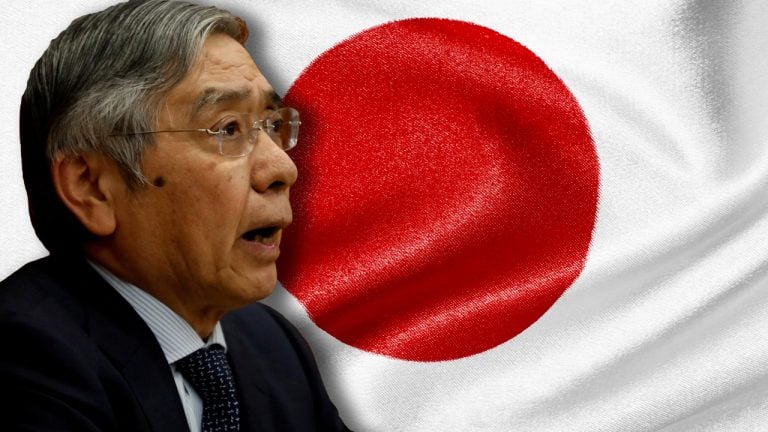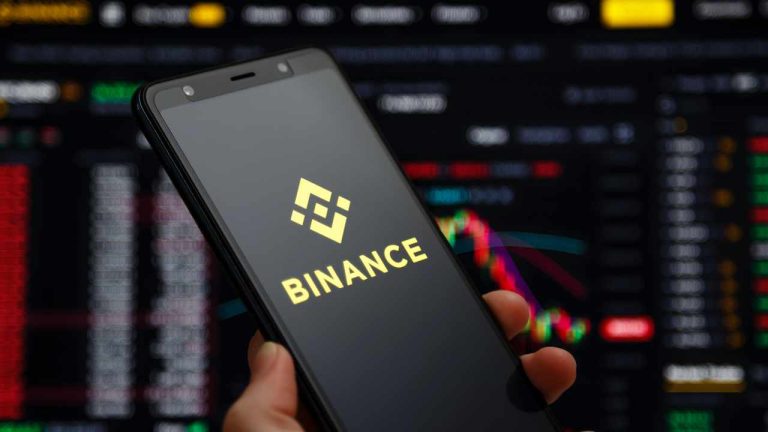 Gumi, a Japanese mobile gaming company, has partnered with Square Enix and SBI Holdings to build new business opportunities around the metaverse. The deal, which also includes the issuance of new stock valued at $52.7 million dollars, will allow the company to acquire financial and content creation experience. Gumi Raises $52.7 Million in Metaverse-Driven Alliance […]
Gumi, a Japanese mobile gaming company, has partnered with Square Enix and SBI Holdings to build new business opportunities around the metaverse. The deal, which also includes the issuance of new stock valued at $52.7 million dollars, will allow the company to acquire financial and content creation experience. Gumi Raises $52.7 Million in Metaverse-Driven Alliance […]
The crypto exchange said it will deregister from Japan’s Financial Services Agency as a crypto asset exchange operator from Jan. 31.
Global cryptocurrency exchange Kraken has decided to pull its operations in Japan for the second time, citing a strain on its resources amid a “weak crypto market.”
In a Dec. 28 blog post, Kraken said it has decided to cease its operations in Japan and deregister from the Financial Services Agency by Jan. 31, 2023, which it said was part of efforts to “prioritize resources” and investments, stating:
“Current market conditions in Japan in combination with a weak crypto market globally mean the resources needed to further grow our business in Japan aren’t justified at this time.”
“As a result, Kraken will no longer service clients in Japan through Payward Asia,” it added.
Kraken’s Japanese-facing exchange is operated by its subsidiary Payward Asia Inc.
The same subsidiary company operated in Japan from 2014 to 2018, before pulling out in April 2018 so that it could better focus its resources on growth in “other geographical areas.”
In October 2020, the subsidiary decided to relaunch with a headquarters in Tokyo, offering spot trading on five major assets with plans to expand. The second iteration has now come to an end, with Kraken committing to allowing all affected clients to withdraw their funds from the exchange by Jan. 31, at the latest.
Users can withdraw crypto holdings to an external wallet, or convert their portfolio to Japanese yen and then transfer it to a domestic bank account. Withdrawal limits will be removed in January and there will also be a process to allow users to retrieve their staked Ether (ETH), which will be shared shortly.
Deposits will be disabled on Jan. 9, though trading functions will remain.
There has never been a dull moment in crypto, and this year was no different.
— Kraken Exchange (@krakenfx) December 27, 2022
For a recap, check out Kraken's 2022 Year in Review: https://t.co/dXF64amFpM pic.twitter.com/kIkeKarmMQ
Kraken appears to have been focusing on cutting costs in recent months.
On Nov. 30, Kraken announced it had made one of its “hardest decisions” to cut its global workforce by approximately 1,100 people, equivalent to 30% of its headcount, amid difficult market conditions.
Related: Kraken cuts workforce by 30% in an effort to survive crypto winter
The exchange said lower trading volumes and fewer client sign-ups contributed to Kraken’s decision to cut down on expenses and that the changes were necessary “to sustain the business for the long-term.”
In the Japanese language version of the most recent announcement, Kraken added that its exit from the Japanese market will not have a material impact on Kraken’s overall business.

None of the 31 crypto exchanges registered with Japan's Financial Services Agency are currently offering trading in stablecoins like USDT or USDC.
Japanese regulators are reconsidering some major cryptocurrency restrictions related to the use of stablecoins like Tether (USDT) or USD Coin (USDC).
The Financial Services Agency (FSA) of Japan will lift the ban on the domestic distribution of foreign-issued stablecoins in 2023, local news agency Nikkei reported on Dec. 26.
The new stablecoin regulations in Japan will allow local exchanges to handle stablecoin trading under condition of asset preservation by deposits and an upper limit of remittance. “If payment using stablecoins spreads, international remittances may become faster and cheaper,” the report notes.
Allowing stablecoin distribution in Japan will also require more regulations related to Anti-Money Laundering controls, the FSA said. The authority on Monday started collecting feedback on proposals for lifting the stablecoin ban in Japan. As previously reported, Japan’s parliament passed a bill to ban stablecoin issuance by non-banking institutions in June 2022.
The latest measure will significantly impact cryptocurrency trading services offered in Japan as currently no local exchanges provide trading in stablecoins like USDT or USDC.
According to official data, none of 31 Japanese exchanges registered with the FSA — including firms like BitFlyer or Coincheck — were handling trading in stablecoins as of Nov. 30, 2022.
BitFlyer, one of the largest cryptocurrency exchanges in Japan, trades a total of five cryptocurrencies at the time of writing, including Bitcoin (BTC), Ether (ETH), Bitcoin Cash (BCH), XRP (XRP) and Stellar (XLM), according to data from CoinGecko.
The FSA did not immediately respond to Cointelegraph’s request for comment.
Related: Stablecoin settlements can surpass all major card networks in 2023: Data
Japanese authorities have been actively working on crypto-related regulations recently. On Dec. 15, Japan’s ruling party, the Liberal Democratic Party’s tax committee, approved a proposal removing the requirement for crypto firms to pay taxes on paper gains issued tokens. Previously, local regulators also issued recommendations against usage of algorithmic stablecoins like Terra USD (UST).
 The Japanese yen is up 3.42% against the U.S. dollar on Tuesday as the Bank of Japan surprised the world by deciding to allow the benchmark interest rate to rise to 0.5% from 0.25%. The Japanese central bank was one of the only banks worldwide to hold off on raising benchmark interest rates, as policymakers […]
The Japanese yen is up 3.42% against the U.S. dollar on Tuesday as the Bank of Japan surprised the world by deciding to allow the benchmark interest rate to rise to 0.5% from 0.25%. The Japanese central bank was one of the only banks worldwide to hold off on raising benchmark interest rates, as policymakers […]
As it stands, Japanese crypto issuers are required to pay a set 30% corporate tax rate on their holdings, even if they haven’t realized a profit through a sale.
The Japanese government is set to ease tax requirements for local crypto firms, as it pushes to stimulate growth in the domestic finance and tech sectors.
At present, Japanese firms that issue crypto are required to pay a set 30% corporate tax rate on their holdings, even if they haven’t realized a profit through a sale. As such, a number of domestically founded crypto/blockchain firms and talent have reportedly chosen to set up shop elsewhere over the past few years.
Japan’s ruling party, the Liberal Democratic Party’s (LDP) tax committee held a meeting on Dec. 15 and approved a proposal — initially tabled in August — which removes the requirement for crypto companies to pay taxes on paper gains from tokens that they have issued and held.
The softer crypto tax rules are expected to be submitted to parliament in January, and go into effect for Japan’s next financial year starting on April 1.
Speaking to Bloomberg on Dec. 15, LDP lawmaker and member of its Web3 policy office Akihisa Shiozaki noted that “this is a very big step forward,” adding that “It will become easier for various companies to do business that involves issuing tokens.”
The latest move from the government appears to signal that its hunger to promote and develop the domestic crypto and Web3 sector hasn’t waned despite the FTX disaster,
Prime Minister Fumio Kishida emphasized in October that NFTs, blockchain and the Metaverse will play important roles in the nation’s digital transformation. The PM cited the digitization of national identity cards as an example.
In October the Japan Virtual and Crypto Assets Exchange Association also announced plans to walk back the stringent screening process for listing new tokens on exchanges, something which Kishida had called on the self-regulatory organization to do back in June.
Related: FTX wants permission to sell FTX Japan and FTX Europe as well as LedgerX
Such forward thinking sentiments have also been shared by key figures in the private sector. On Dec. 8 banking giant Sumitomo Mitsui Financial Group (SMBC) announced that it is working on an initiative to explore the use cases of soulbound tokens (SBTs).
SBTs refer to a proposal from Ethereum co-founder Vitalik Buterin concerning the use of tokens to represent people’s digital identity.

Japanese authorities have postponed FTX Japan’s suspension deadline because the firm has so far failed to return assets from custody to creditors.
The Japanese subsidiary of the now-defunct cryptocurrency exchange FTX has received approval from local regulators to continue sorting out issues with withdrawals until next year.
The Kanto Local Finance Bureau, a local financial regulator, running under the Ministry of Finance of Japan, has issued a statement regarding FTX Japan operations, Reuters reported.
The Japanese authority has postponed FTX’s business suspension deadline until March 9, 2023, extending the original time limit by three months. In mid-November, Japan’s Financial Services Agency (FSA) initially requested FTX Japan to suspend business orders by Dec. 9.
According to the announcement, the Kanto Local Finance Bureau has ordered the extension of the deadline because FTX Japan has so far failed to return assets from custody to creditors. The regulator emphasized that FTX Japan’s trading system continues to be out of function.
FTX Japan subsequently confirmed the latest news in a blog post, stating that the exchange is proceeding with a “business improvement plan” that the firm submitted to the Kanto Local Finance Bureau on Nov. 16. The exchange noted that the platform has been out of function, adding that it’s “not possible to quickly return customer’s assets.”
Related: FTX-owned Liquid exchange pauses all trading after withdrawal halt
The news comes shortly after FTX Japan on Dec. 1 released a roadmap to resume withdrawals. The exchange previously confirmed that its customers’ assets were not part of FTX’s bankruptcy proceedings. The firm was initially planning to resume withdrawals by the end of 2022.
As previously reported, FTX launched its Japanese arm in June 2022 after acquiring Japanese crypto exchange Liquid in February.

Japan’s financial giant Sumitomo Mitsui Financial Group is experimenting with soulbond tokens to satisfy new social needs.
The Japanese financial group Sumitomo Mitsui Financial Group (SMBC) is moving to explore the benefits of Web3 by issuing soulbond tokens (SBTs).
Proposed by Ethereum creator Vitalik Buterin, SBTs refer to digital identity tokens that represent the characteristics or reputation of a person or entity, or a “soul.” Such tokens are non-transferable and are designed for the decentralized society and Web3.
SMBC officially announced on Dec. 8 an initiative focused on the practical use of SBTs in partnership with the digital asset firm HashPort.
The companies plan to conduct research on SBTs to find out their practical uses for communities, jobs, knowledge sharing services and decentralized autonomous organizations (DAOs).
According to SMBC, the development could specifically be useful for individuals increasingly assuming diverse roles and personalities within society. The company stated:
“It is expected in this new society that each individual will be able to control which personality he/she displays in each community in which he/she participates. SBTs satisfy these new social needs through the use of multiple ‘souls’.”
One of the practical uses of an SBT could be a situation where a user has a role of a working adult and another role of a music fan. “If this user wants to prove his/her skills and work history when changing jobs, he/she can simultaneously prove his/her identity and his/her career information associated with them by allowing his/her employer to reference the SBTs,” SMBC said.
The company also noted that the partnership with HashPort can be put to practical use in the future and is a meaningful initiative to drive the growth of the Web3 economy in Japan.
“The two parties will also consider undertaking content business associated with NFTs and developing infrastructure for the Web3 economic zone to encourage the spread of the token business both in Japan and overseas,” the announcement notes.
Related: Japan recommends against algorithmic backing in stablecoins
A major financial institution in Japan, SMBC is part of Mitsui Group, which is one of the largest corporate groups in the world. Various companies within Mitsui have been actively exploring blockchain and cryptocurrency tools in recent years.
In February, Japanese trading house Mitsui was reportedly planning to issue a cryptocurrency pegged to gold, called ZipangCoin. Previously, Sumitomo Mitsui Trust Bank launched asset-backed securities tokens in partnership with Securitize in March 2021.

The potential legal status of the Japanese Financial Service Agency’s recommendation is not clear as the current legislation is silent on algorithmic stablecoins.
After passing its landmark legislation on stablecoins in June, Japanese regulators are considering complementing it by restricting the algorithmic backing of stablecoins. The intention comes as a recommendation from the Financial Service Agency (FSA) and was repeated by the country’s Vice Minister for International Affairs, Tomoko Amaya.
During his speech on crypto assets at a roundtable hosted by the Official Monetary and Financial Institutions Forum (OMFIF), Amaya laid out Japan’s regulatory framework, emphasizing the factors of financial stability, user protection, and anti-money laundering/ combating the financing of terrorism (AML/CFT). The speech was originally held in November, but the FSA published the full document on Dec 7.
The 29-paged presentation systemizes the Japanese approach to crypto regulation, formed by several major legislations — the Banking Act, the Payment Services Act and the Financial Instruments and Exchange Act. One familiar with the Japanese regulatory environment couldn’t find anything new at this point, although the accent on differentiating between the “crypto assets” and “digital-money type stablecoins” gives a distinct perspective on the local regulators’ approach to the latter.
Related: Bank of Japan to trial digital yen with three megabanks
Amaya’s speech also doesn’t specify any particular dates or headlines for future legislation. However, at the end of the document, in the “Way Forward” section, the Vice Minister cites the FSA recommendations, reportedly made in October. As the quote goes:
“The proposed review states that ‘global stablecoins must not use algorithms in stabilizing their value’ and strengthens the ensuring of redemption rights.”
This recommendation would probably be taken into consideration by lawmakers in the future, as the current stablecoins’ regulation, which was passed by Parliament in June and will become law in June 2023, doesn’t cover algorithmic stablecoins. The bill itself came in the aftermath of a massive decline in cryptocurrency markets fueled by the Terra tokens collapse, with the algorithmic stablecoin Terra USD (UST) losing its 1:1 value to the U.S. dollar in early May.
 Cryptocurrency exchange Binance has acquired a regulated Japanese cryptocurrency exchange and is now preparing to enter the Japanese crypto market as a regulated entity. “The Japanese market will play a key role in the future of cryptocurrency adoption,” said the general manager of Binance Japan. Binance Entering Japan Cryptocurrency exchange Binance announced Wednesday that it […]
Cryptocurrency exchange Binance has acquired a regulated Japanese cryptocurrency exchange and is now preparing to enter the Japanese crypto market as a regulated entity. “The Japanese market will play a key role in the future of cryptocurrency adoption,” said the general manager of Binance Japan. Binance Entering Japan Cryptocurrency exchange Binance announced Wednesday that it […] Cryptocurrency exchange Bitfront has announced its intention to cease operations in the coming months, citing challenges facing the industry. The U.S. trading platform, backed by Japan’s social media giant Line, indicated the decision is unrelated to the collapse of FTX. Line-Supported Digital Asset Exchange Bitfront Suspends New Sign-ups Bitfront, a crypto exchange operating in the […]
Cryptocurrency exchange Bitfront has announced its intention to cease operations in the coming months, citing challenges facing the industry. The U.S. trading platform, backed by Japan’s social media giant Line, indicated the decision is unrelated to the collapse of FTX. Line-Supported Digital Asset Exchange Bitfront Suspends New Sign-ups Bitfront, a crypto exchange operating in the […]